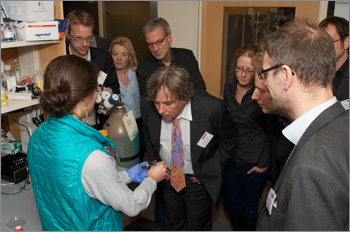Leading Researchers Share Insights from Cutting-Edge Work
Nanorobots that deliver messages to specific cells in the body, DNA strands that self assemble into drug delivery devices, and microchips that mimic human organ functions were among the cutting-edge technologies shared with a Scandinavian mission to the Wyss Institute on January 27, 2012.

The Nanomedicine Partnering Mission 2012 brought 30 academics, researchers, clinicians, and industry executives from Denmark and Sweden to meet with Wyss researchers. The visit to the InstituteÍs facilities in Bostonwas the final stop of a week-long tour that targeted North Carolina and Massachusetts as two of the most important nanomedicine hubs in the United States.
Don Ingber, M.D., Ph.D., welcomed the delegation to the Wyss Institute with an introduction and overview of its research projects and unique model for technology translation. The program continued with presentations on DNA Origami by William Shih, Ph.D.; on a logic-gated nanorobot for targeted transport of molecular payloads by Shawn Douglas, Ph.D.; and on organs-on-chips technologies by Geraldine Hamilton, Ph.D. The delegation later toured the Institute laboratories, meeting with other researchers to hear about their work.
The partnering mission was sponsored by Nano Connect Scandinavia, ScandinaviaÍs largest initiative for strengthening cross-border collaboration in nanotechnology, and Medicon Valley Alliance, a Danish/Swedish nonprofit organization that works to create new research and business opportunities in the life sciences. The Massachusetts Biotech Council orchestrated the Massachusetts portion of the trip.
The trip was designed to help delegates expand their networks of U.S. experts in nanomedicine, while receiving updates on the latest research and business trends at the same time. The overall goal was to create lasting international collaborations among researchers, executives, and investors.
The tour included visits to universities and research centers that had been identified as among the most innovative in the world. In addition to the Wyss, the delegates met with researchers at Boston University, Duke University, HarvardÍs Science Center, the MIT-Harvard center of Cancer Nanotechnology Excellence, and the Research Triangle Institute.